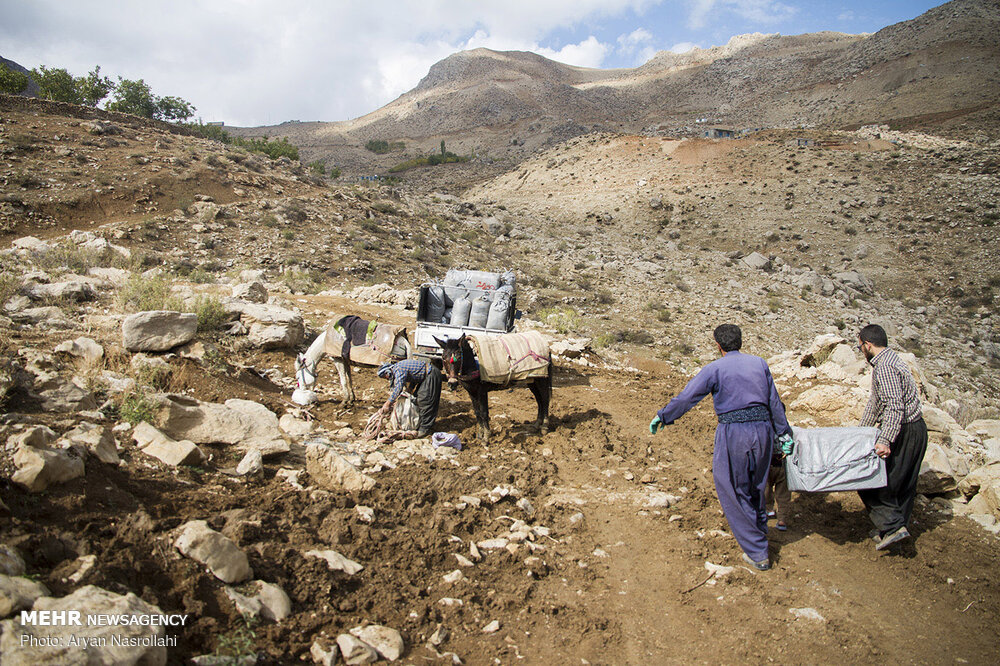In Iranian Kurdistan, the opportunities for employment are bleak and this situation has led to many Kurds to become Kolbars. The word Kolbar is derived from the Kurdish words, “kol” (back) and “bar” (load) and translates into “one who carries load”. Kolbars make their living through the smuggling of untaxed goods, which include cigarettes, mobile phones, clothes, housewares, tea and alcohol across the perilous terrain of the Iran-Iraq border. The goods often weigh somewhere between 25 to 75 kilograms and are transported by foot through the mountainous border region for a meagre wage. This profession has become a dominant mode of employment for Rojhelat Kurds over the last decade, with individuals increasingly forced to take up this profession due to limited employment opportunities available to them. Despite its prevalence, the plight and treacherous conditions of these workers have received little to no media coverage and scant scholarly attention. Barring a few reports by BBC, Al-Monitor and other international media houses, the coverage on Kolbars is left to the vernacular media and Kurdish media circles.
Economic Considerations
The struggle to make ends meet is the primary driver for taking up the profession. As a result of decades of American sanctions and (on the domestic front) severe mismanagement by government officials, around 70% of Iran’s population is dependent on government handouts. In Kurdistan province, opportunities are even more limited, with over 50% of the workforce unemployed and Inflation at over 45%. This has led to a scenario where tens of thousands of Kurdish men, many of whom are highly educated are forced to take up work as Kolbars to make ends meet. This situation has worsened under the spectre of COVID- 19, with Kurdistan experiencing the highest fatality rate in the country at 12.62% and limited hospital beds available with an average of just 143 beds for every 100,000 people. The effect of this on the populace, in addition to the deliberate and sustained oppressive state policy towards the Kurdish populace, has pushed many young men into the Kolbar profession in order to support their ailing relatives.
As a small cog in a very profitable machine, the Kolbars take the most significant risks, with powerful businessmen in Tehran, Erbil and across the middle east making most of the profits. Reported to be worth $8 billion a year, most Kolbars are paid as little as $30 per trip, and if unable to complete the journey successfully are expected to reimburse their employer the cost of the goods lost. There are claims of Islamic Revolutionary Guard Corps (IRGC) involvement in the trade-in ensuring that the smugglers routes remain open. However, this has not prevented Border guards from punitively torturing and killing hundreds of Kolbars over the past ten years, with indiscriminate targeting of these porters increasing significantly over the past five years.
Indiscriminate Killings
No state laws explicitly criminalise Kolbars, however, over the past ten years, there has been a notable increase in indiscriminate killings by Iranian Border guards. Over the course of 2018, Iranian border guards killed 48 and injured104, according to Iran Human Rights Monitor. In 2019, the number increased with at least 70 Kurdish Kolbars and businessmen killed while 154 Kolbars and border businessmen were injured.
Many of these deaths have been characterised by their brutality, often being targeted from close range and without any warning. Despite an increase in protests against the killings, little has changed. This is despite Iranian domestic laws stating that the use of firearms should only be used as a last resort. This indifference and lack of action to prosecute the border guards has fostered a culture of impunity on part of the authorities. Furthermore, the incarceration of many more without the opportunity of getting a fair trial represents a fundamental attack on their human rights.
As part of the American push towards crippling the Iranian economy, there are indirect pressures to sea Iran’s borders. The US has influenced the Peshmerga to crack down on Kolbars travelling through the border. The subsequent search for alternative routes resulted in exposure to minefields and snowstorms, raising the risks further. In 2019, 23 Kolbars froze to death, according to statistics compiled by Kurdistan Human Rights Network. The harrowing accounts of two Kolbars were recorded by Fazel Hawramy in his article for Rudaw which also showcased this unreported human rights crisis unfolding in the region. As individuals are forced to take up this profession, much needs to be done to highlight the plight of these workers and the risks they face for such a paltry sum of money.

